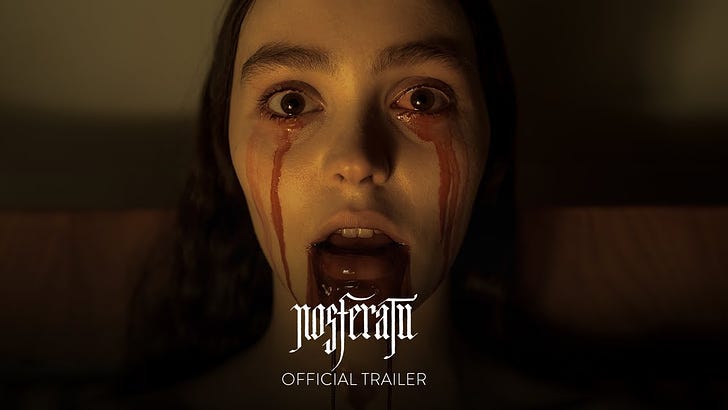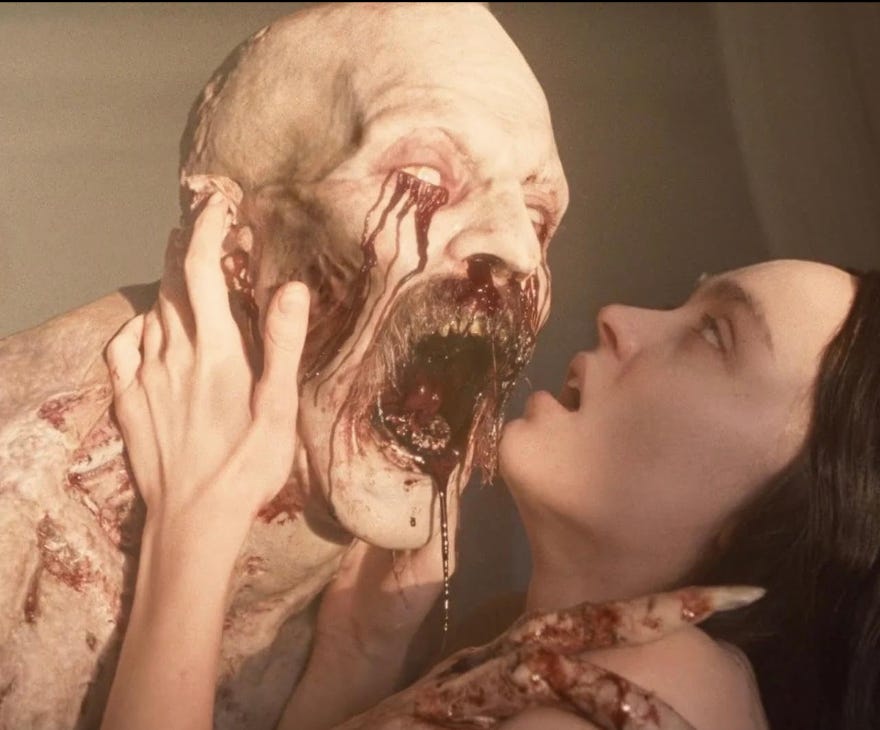By Tyia Burnett
Happy Friday Coven!
With Nosferatu (2024) now streaming and the award’s show season at a close, let’s talk more about Nosferatu and some themes within the film.
***WARNING: NOSFERATU SPOILERS AHEAD***
PLOT SUMMARY
Nosferatu is a gothic horror film about young, newlywed couple, Ellen and Thomas Hutter. The film begins with a flashback to Ellen’s childhood: after her mother's death, Ellen called upon a supernatural being to save her from loneliness. This encounter resulted in Nosferatu forcing Ellen to pledge herself to him. Years later, Ellen marries Thomas and the pair reside happily in the town of Wisburg. One night, Ellen experiences a resurgence in her childhood night terrors and becomes paranoid that Nosferatu is finally coming to claim her. This anxiety only heightens when Thomas is sent away by his boss Herr Knock to sell Grünewald Manor to a mysterious Count Orlock living in Romania. Knock informs Thomas that he must visit The Count in person to close the deal, as Orlock is too fragile to travel. Ellen begs Thomas to stay, but his debts to his wealthy friend, Friedrich Harding, coupled with his desire to provide a better life for Ellen ultimately sway his decision to leave. Thomas leaves Ellen in the care of Friedrich and his pregnant wife Anna, who is also Ellen’s best friend. After Thomas’ departure, Ellen begins to experience intense fits and episodes, and a scientist eventually deems her possessed by a supernatural being. The Harding couple’s young daughters are also haunted by visions of a monster. Stressed and confused, Friedrich struggles to find ways to help Ellen. Meanwhile, Thomas arrives at the Romanian manor, only to discover that the Count is more sinister than he expected and his wife is in grave danger.
***WARNING: BABYGIRL SPOILERS AHEAD***
ANALYSIS
For the past two months, my social media pages have been dominated by Nosferatu references. Initially, I tried to avoid them because my Christmas Day cinema trip was reserved exclusively for Babygirl (2024). Even though I was excited about Nosferatu, I needed more time to process Babygirl before watching another film. After failing to double-bill the two, I have since watched Nosferatu multiple times and I think I may have an unpopular opinion…
After finally watching the film, I am confused by the countless videos and memes I have been sent about Ellen craving Count Orlock and enjoying their encounters. While the film is meant to explore themes of sexual repression and critique the confines of womanhood and sexuality in the era, Ellen’s obvious disdain for Orlock overshadowed these themes for me. Ellen and Thomas are also affectionate and seemingly have a healthy sexual relationship. Comparatively, in Babygirl the main character, Romy Mathis, is unsatisfied by her marital sex life. After failing to orgasm with her husband, Romy sneaks away to privately watch porn and masturbate. One of the most intense scenes in the film involves a confrontation between Romy and her husband, in which she yells, “I can’t cum with you!” This is a particularly jarring reveal as the couple have been together for decades and have an otherwise loving, communicative and happy marriage.
In contrast, Ellen and Thomas do not experience this issue. In the very beginning of the film, Ellen playfully asks Thomas to stay home from work and come back to bed. Later, after Count Orlock possesses her and forces her to say to Thomas, “You could never please me as he could,” Ellen retaliates by initiating sex with Thomas and screaming “Let him see our love!”
When Ellen confides in her husband about Orlock taking her as a lover at fifteen, she is indeed afraid and feels ashamed. However, I believe this shame is not based on her sexuality inherently, but instead derived from that initial assault and her gradual realisation that she was taken advantage of at a young age. Because of the concerning politics about age and consent, I cannot join the internet in championing this film as humorously depicting “a woman horny for vampire sex.”
Ellen was a grieving child and it is clear the experience with Orlock traumatizes her, spurring on deep fits of anxiety and terror. It is hard to consider their relationship to be one of devotion when it is very apparently one of fear. When Orlock arrives in town and comes to Ellen, she refuses him. Rather than accepting her answer and departing, Orlock tells Ellen she must give herself to him in three days or he will kill all her loved ones, including her husband. On the second night, he kills her best friend Anna, as well as Anna and Friedrich’s children in response to Ellen’s refusal. A plague is also unleashed on the town, killing many innocent people. Ellen becomes aware that this curse will only end if she complies with Orlock’s demands. This coercive dynamic further contradicts the film’s supposed readings of sexual repression, as Ellen does not truly consent to Orlock nor does she ever wish to "Give in to her desires." Ellen commits the ultimate act of devotion to Thomas when she sacrifices herself to Orlock to protect him. This act ultimately grants her more agency, as she actively makes the choice and does so with the intention of killing the Count once and for all.
Therefore, I can only squirm at the persistent memes about women wanting a man who is as devoted as Count Orlock since the film’s Christmastime release. Yes, your situationship did not get you a Christmas present. However, an entity sailing the seas, psychologically tormenting you, trying to kill your husband, killing innocent people in your town, and demanding you to be with him even after you refuse him is not the devotion you’re looking for, Pookie. Given the prevalence of this online take, I feel the need to break down the difference between devotion and obsession using specific moments and motifs in the film.
Devotion versus Obsession: What’s the difference?
The Locket: In the film, Ellen gifts Thomas a locket with a piece of her hair inside to take with him while traveling so that she can remain be close to him. It is notable that Ellen gifts this to Thomas, while Count Orlock steals it from Thomas. This theft foreshadows Orlock’s manipulation of Thomas in order to gain more access to Ellen and break their marital bond. Once Orlock possesses Ellen’s hair, her condition worsens as he starts appearing more vividly in her visions.
Thomas’s Return v. Orlock’s Voyage: After escaping Orlock by jumping out of a window, Thomas is cared for by nuns. Despite his illness and injuries, Thomas journeys by horse through the rain to return to Ellen because he knows she is in danger and her safety means more to him than his life. By comparison, Count Orlock journeys to Ellen by ship because he is aware she is alone, distressed and vulnerable, having orchestrated Thomas’ entire trip with his servant, Herr Knock.
“He’s Here!”: When Orlock arrives at Wisburg in his rat-infested ship, Herr Knock dramatically announces, “He’s here!” and rushes to the ship to greet him. In contrast, Ellen exclaims the same words out of utter relief and she rushes to meet Thomas at the exact same time. While Orlock’s servant Her Knock has seemingly lost his entire self to Orlock’s control, Ellen gains more clarity and peace from Thomas’ presence. When Thomas is recovering from Orlock’s bites and his spell, Ellen stays by his side lays on his chest and never leaves him, even when he pushes her away. Similarly, when Ellen is experiencing a fit of possession, Thomas reassures her that he will never leave her and that she is safe with him.
The Final Act: When Orlock’s obsession with Ellen casts a plague on the town, Ellen begins to realize and accept that only she has the power to end the terror. These thoughts are confirmed by the professor who agrees to distract Thomas and Friedrich by taking them on a wild goose chase to kill Count Orlock, while Ellen sorrowfully bids farewell to Thomas and prepares for Orlock’s arrival. Once Thomas realizes he has been misled, he rushes to Ellen without any regard for his own safety. Ellen notices the sun is beginning to rise and signals for Orlock to drain her so that he will burn in the sunlight. Ellen’s choice is an act of self-sacrifice, love and devotion. Even though she ultimately dies as a result, this final scene allows her to transcend the role of the helpless victim and slay her Orlock, removing his power and regaining hers.
Throughout the film, the love and devotion between Ellen and Thomas is repeatedly reinforced and put in direct contrast with Orlock’s obsession and manipulation. In conclusion, Count Orlock is not devoted to Ellen; he is obsessed with her and only seeks to continue controlling her, whereas Thomas’ devotion comes from his wish to love and protect Ellen, without any ulterior motives to control her. By killing Orlock, Ellen is able to reclaim her life, protect her husband, and take vengeance against her tormenter.
Have you seen Nosferatu yet? If so, leave a comment below — we would to hear your thoughts!
Happy Valentine’s Day, Coven! <3











